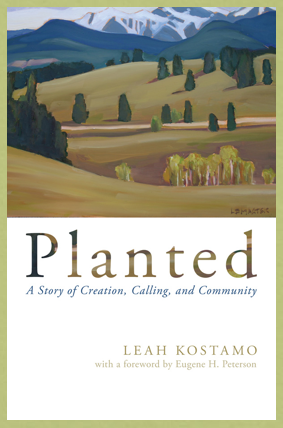It has always puzzled me why so few Christians are on the vanguard of stewardship and environmental issues. If indeed God created this beautiful earth and then gave us the responsibility of caring for it, shouldn’t we prioritize this alongside of worshiping only one God, not murdering, and keeping the Sabbath? Instead, those of us who consider ourselves Christians tend to let a selective few (Wendell Berry, Eugene Petersen, Calvin DeWitt, Peter and Miranda Harris, among others) do the heaving lifting while we watch from the couch. After reading Leah Kostamo’s book Planted: A Story of Creation, Calling, and Community, I get the sense that maybe, just maybe, that is changing.
Back in 1999, Peter and Miranda Harris (the original founders of A Rocha, Portugal) taught a class called Incarnational Mission at Vancouver’s Regent University. According to Kostamo, “They loved God, they loved people, and they loved creation. . . . For many of us [in the class], their embodiment of faith helped us to shift environmental stewardship from a fringe concern to a thoroughly normal part of our Christian lives.” Not long after, Leah and Markku Kostamo set their sights on establishing a North American version of A Rocha, focused on conservation, education, restoration, community agriculture, and sustainable living.
Leah Kostamo chronicles her family’s journey in Planted. Their radical and risky choice to exit the superhighway heading to the American dream of more stuff was based on four core beliefs; the earth is the Lord’s; creation is good; everything is connected; and, we are to have hope. Such visionary thinking has allowed them to integrate stewardship into every component of their lives. They are committed to “caring for all of God’s creation in holistic ways—the more threatened zoological bits, but also the more threatened human bits too.” With the help of staff and volunteers, they preserve the habitat of the Chinook salmon but they also extend themselves to the hundreds of individuals who show up on their doorstep each year. (Kostamo describes A Rocha as, “Youth hostel meets Sierra Club set on an organic farm.”)
I wonder if part of the reason that stewardship has taken so long to appear on Christians’ radar has been the tone that many activists employ. There’s either a shrill, dire, and predictably guilt ridden vibe or an all or nothing gauntlet that tends to alienate potential converts. Not so with Kostamo. In her world, you are free to live out your own convictions; you can consume meat (though she doesn’t), use a clothes dryer (though she doesn’t), or load your dish washer with abandon (as Leah gratefully does). I get the feeling that she exudes God’s grace and mercy, even as she humbly acknowledges her limitations. “If marriage is a mirror, then intentional community living is a hours of mirrors. The trick to doing it semi-well is to keep loving and forgiving—especially oneself—in the midst of the grind of everyday life.”
This commitment to whole and holy living is rare and it can’t be pulled off without a deep well of hope. “Hope is a rare commodity in the environmental world. . . . Knowing what conservationists know, it’s only logical that they would be tempted to despair. But the Christian way is one of hope.” In Colossians 1:15-20, Paul “links creation and humanity’s redemption through the person of Jesus. Through Christ, all things were created; he sustains all things (holds them together), and then through his resurrection, he reconciles all things. . . . The overarching theme of redemption for all of creation, is meant to root us in hope—a hope centered on God’s ultimate care for what he has made.”
Kostamo’s life radiates a hope that’s infectious. And not only hope, but also purpose and gratitude. As I turned the pages, I found my commitment to stewardship strengthened and my heart overflowing with thankfulness.
In the midst of winning us over, the author slips in a few confrontations—most notably on the topic of our “addiction to consumption.” Our compulsive consumerism forces us into a viscous cycle of earning more so we can buy more; it also erodes our capacity for gratitude. “When we are satisfied with our lives as being enough, we are able to resist the whispers of consumerism that tell us we don’t have enough or we are not enough.” I firmly believe that consumerism is one of the America’s root sins. Coupled with entitlement, it leads us to believe we should be able to have whatever we want, regardless of the cost to our souls or others’ well-being. Stewardship as a life-style could free us from this bankrupt pattern.
Though Kostamo is smart enough to realize that few of us will make the radical choices she and her husband have, she does not leave us any wiggle room to ignore God’s universal call:
“While creation care as a vocation is a specific calling, as a way of life, it is everyone’s calling. Just as every Christian is called to witness to God’s love and to promote justice for those without a voice, so too, all Christians are called to steward creation.”
This is a unique book and the Kostamos are a remarkable family. Perhaps as more of us embrace the whole gospel with all of who we are, Leah and Markku will see their choices joyfully replicated across the globe.
Planted, available through Amazon.
Check out A Rocha’s website for more encouragement.
Thanks for reading. If you like what you see, please consider subscribing to my site. Simply add your email to the Subscribe box on the upper right of this page and then respond to the confirmation email. You can also support me on Patreon.
